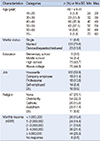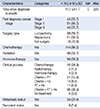Abstract
Purpose
The purpose of this study is to verify the validity and reliability of the the Inner Strength Questionnaire-Korean version (ISQ-K).
Methods
The questionnaire was provided to breast cancer survivors in two Cancer centers in Gyeonggi, Korea and 167 surveys were analyzed. Data were analyzed by CVI for contents validity, confirmative factor analysis for construct validity and correlation for criteria validity. Test-retest analysis and Cronbach's α was calculated for reliability.
Results
Content validity was excellent. Confirmative factor analysis was performed on 4 factors based on the original structures and the goodness-of-fit was as followed: χ2 =784.01, df=318, RMSEA=.09, TLI=.78, CFI=.72, GFI=.72. Standard errors of variance ranged from 0.06 to 0.15. Inner strength was correlated positively with resilience (r=.47, p<.001). Test-retest reliability was 0.90 and internal consistency was indicated by Cronbach alphas of 0.85 for inner strength.
Figures and Tables
Table 1
Sociodemographic Characteristics (N =167)

Table 2
Clinical Characteristics (N =167)

Table 3
Correlation Coefficients among the ISQ-K Scores and Factor Scores (N =167)

| Variables | ISQ-K | Eng | Conn | Ang | Mov |
|---|---|---|---|---|---|
| ISQ-K | 1 | .71 (<.001) | .63 (<.001) | .60 (<.001) | .53 (<.001) |
| Eng | - | 1 | .21 (<.001) | .37 (<.001) | .36 (<.001) |
| Conn | - | - | 1 | - .002 | .30 (<.001) |
| Ang | - | - | - | 1 | - .07 |
| Mov | - | - | - | - | 1 |
Table 4
Confirmative factor analysis results of ISQ-K (N =167)

Table 5
Reliability of the ISQ-K

References
1. Korea Center Cancer Registry. 2012 National Cancer Statistics Korea Center Cancer Registry. 2014. Accessed April 18, 2015. http://www.cancer.go.kr/ebook/104/PC/104.html.
2. Hong SK. Concept development of resilience: focusing on cancer patients. J Korean Acad Soc Nurs Educ. 2009; 15(1):109–119.
3. Annunziata MA, Muzzatti B, Giovannini L, Romito F, Cormio C, Mattioli V, et al. Is long-term cancer survivors’ quality of life comparable to that of the general population? An italian study? Support Care Cancer. 2015; 23(9):2663–2668.

4. Costa-Requena G, Rodríguez A, Fernández-Ortega P. Longitudinal assessment of distress and quality of life in the early stages of breast cancer treatment. Scand J Caring Sci. 2013; 27(1):77–83.

5. Knobf MT. Psychosocial responses in breast cancer survivors. Semin Oncol Nurs. 2007; 23(1):71–83.

6. Koch L, Jansen L, Herrmann A, Stegmaier C, Holleczek B, Singer S, et al. Quality of life in long-term breast cancer survivors-a 10-year longitudinal population-based study. Acta Oncol. 2013; 52(6):1119–1128.

7. Stein KD, Syrjala KL, Andrykowski MA. Physical and psychological long-term and late effects of cancer. Cancer. 2008; 112:Suppl 11. 2577–2592.

8. Härtl K, Schennach R, Müller M, Engel J, Reinecker H, Sommer H, et al. Quality of life, anxiety, and oncological factors: a follow-up study of breast cancer patients. Psychosomatics. 2010; 51(2):112–123.

9. Kwon EJ, Yi M. Distress and quality of life in breast cancer survivors in Korea. Asian Oncol Nurs. 2012; 12(4):289–296.

10. Byun HS, Kim GD. Impacts of fatigue, pain, anxiety, and depression on the quality of life in patients with breast cancer. Asian Oncol Nurs. 2012; 12(1):27–34.

11. Hwang E, Yi M. Factors influencing quality of life in patients with breast cancer on hormone therapy. J Korean Acad Nurs. 2014; 44(1):108–117.

12. Norberg M, Magnusson E, Thyme KE, Åström S, Lindh J, Öster I. Breast cancer survivorship-intersecting gendered discourses in a 5-year follow-up study. Health Care Women Int. 2015; 36(5):617–633.

13. Yun MR, Song MS. A qualitative study on breast cancer survivors’ experiences. Perspect Nurs Sci. 2013; 10(1):41–51.
14. Ryu YM, Yi M. The factors influencing quality of life in women with breast cancer. Asian Oncol Nurs. 2013; 13(3):121–127.

15. Roux G, Dingley C. Promoting inner strength. In : Lester JL, Schmitt P, editors. Cancer rehabilitation and survivorship: transdisciplinary approach to personalized care. Pittsburgh, Pennsylvania: Oncology Nursing Society;2011. p. 295–305. .
16. Dingley C, Roux G. The role of inner strength in quality of life and selfmanagement in women survivors of cancer. Res Nurs Health. 2014; 37(1):32–41.

17. Lewis KL, Roux G. Psychometric testing of the Inner Strength Questionnaire: women living with chronic health conditions. Appl Nurs Res. 2011; 24(3):153–160.

18. Lundman B, Viglund K, Aléx L, Jonsén E, Norberg A, Fischer RS, et al. Development and psychometric properties of the Inner Strength Scale. Int J Nurs Stud. 2011; 48(10):1266–1274.

19. Lundman B, Aléx L, Jonsén E, Norberg A, Nygren B, Fischer RS, et al. Inner strength-A theoretical analysis of salutogenic concepts. Int J Nurs Stud. 2010; 47(2):251–260.

20. Bryant FB, Yarnold PR. Principal components analysis and exploratory and confirmatory factor analysis. In : Grimm LG, Yarnold PR, editors. Reading and understanding multivariate analysis. Washington, DC: American Psychological Association;1995.
21. Vaishnavi S, Connor K, Davidson JR. An abbreviated version of the Connor-Davidson Resilience Scale (CD-RISC), the CD-RISC2: Psychometric properties and applications in psychopharmacological trials. Psychiatry Res. 2007; 152(2):293–297.

22. Jeong HS, Kang I, Namgung E, Im JJ, Jeon Y, Son J, et al. Validation of the Korean version of the Connor–Davidson Resilience Scale-2 in firefighters and rescue workers. Compr Psychiatry. 2015; 59:123–128.

23. Beaton DE, Bombardier C, Guillemin F, Ferraz MB. Guidelines for the process of cross-cultural adaptation of self-report measures. Spine. 2000; 25(24):3186–3191.

24. Polit DF, Beck CT. The content validity index: are you sure you know what's being reported? Critique and recommendations. Res Nurs Health. 2006; 29(5):489–497.

25. Baek HS, Lee KU, Joo EJ, Lee MY, Choi KS. Reliability and validity of the Korean version of the Connor-Davidson Resilience Scale. Psychiatry Investig. 2010; 7(2):109–115.

27. Harrington D. Confirmatory Factor Analysis.(Pocket Guides to Social Work Research Methods Series). New York: Oxford University Press;2009.
28. Davidson J, Connor K. Connor-Davidson Resilience Scale (CD-RISC) manual. unpublished: CD-RICS;2015.




 PDF
PDF ePub
ePub Citation
Citation Print
Print


 XML Download
XML Download